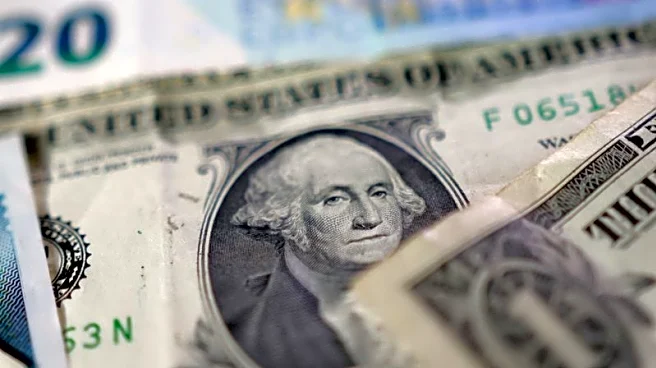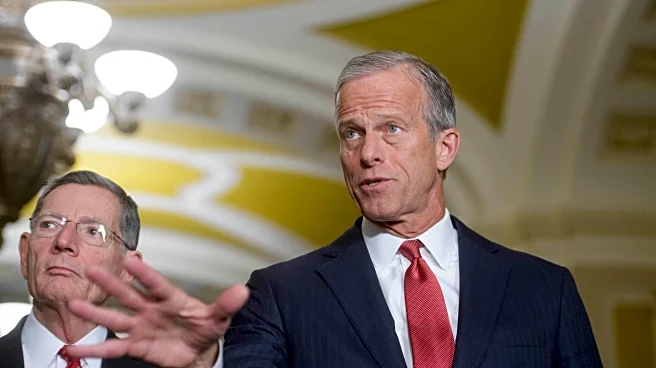By Jamie McGeever
ORLANDO, Florida (Reuters) -TRADING DAY
Making sense of the forces driving global markets
By Jamie McGeever, Markets Columnist
Wall Street wobbled and gold had its biggest fall in two months
on Thursday, backing off from record highs as investors pondered whether a deeper correction might be in the offing amid continued uncertainty caused by the U.S. government shutdown.
More on that below. In my column today I consider what is behind the increasingly loose fiscal policy in many developed economies despite sticky inflation and record public debt. Falling living standards for the younger generations could be a factor.
If you have more time to read, here are a few articles I recommend to help you make sense of what happened in markets today.
Today's Key Market Moves
* STOCKS: New highs for Japan's Nikkei and Germany's DAX,10-year high for China's Shanghai Composite. Wall Street falls -Nasdaq -0.1%, Russell 2000 -0.6%. * SHARES/SECTORS: All but one of the S&P 500's 11 sectors- consumer staples - end in the red. Materials, industrials downaround 1.5%. Biggest stock decliner is Dell, -5%. * FX: Dollar highest in over two months. Gains 1% or morevs Swedish and Norwegian crowns. Argentina's peso rises afterU.S. confirms $20 billion swap line. * BONDS: Treasury yields trade in very narrow 2-3 bpsrange, 30y auction is unremarkable. * COMMODITIES/METALS: Gaza ceasefire moves markets. Golddips below $4,000/oz, oil falls 1.5%. But silver hits new highabove $51/oz, LME copper breaks $11,000/ton, highest since Maylast year.Today's Talking Points:
* Bubble sirens get louder
The stock market bubble warnings from on high are picking up. This week we have had the Bank of England, IMF and now JPMorgan boss Jamie Dimon weigh in on the risk of a painful correction and the economic damage that could unleash.
Is it different this time? Perhaps - interest rates are falling, not rising; there's no household or business credit bubble; leverage is generally low. Yet the surge in prices, tech valuations, and market concentration is eye-watering. The AI frenzy is surely unsustainable, right?
* Private markets reel
The bankruptcy protection filing by U.S. auto parts firm First Brands - and mysterious disappearance of $2.3 billion - is intensifying speculation that all is not rosy in the private credit garden. Could this be where bubble risks lie, rather than public markets?
Shares in firms heavily involved in private markets like KKR, Carlyle Group and Blackstone are getting slammed as investors fret First Brands' murky finances are not an isolated case. "The opaqueness is part of the process. That's a feature not a bug," investor Jim Chanos told the FT last week.
* U.S. earnings season kicks off
The Q3 earnings season kicks into gear next week with mega financials - Goldman Sachs, BlackRock, Citi, JPMorgan, Morgan Stanley etc - all reporting. The focus, however, will perhaps be on the tariff-affected consumer and retail sectors and, of course, Big Tech.
How does the big picture look? The consensus estimate according to LSEG is 8-9% earnings growth. But LPL Financial analysts reckon GDP growth of around 3%, AI capex booming, and a weaker dollar, mean another quarter of low-teens growth is likely. Health warning though - 70% of the consensus estimate is from the biggest six tech firms (Mag 7 minus Tesla).
The kids are not alright. Is global fiscal splurge the answer?
If you're wondering why there is so little desire anywhere in the developed world to tighten fiscal or monetary policy, take a look at a chart published this week by the International Monetary Fund. It is worth a thousand words.
In a preview of the Fund's upcoming World Economic Outlook, Managing Director Kristalina Georgieva presented a chart taken from a paper by Harvard-based researchers showing that the likelihood of young Americans growing up to earn more than their parents has never been lower.
Barely half of Americans aged 30 are earning more than their parents, compared with more than 90% half a century ago, the study finds. It's a stark statistic that calls into question not only the "American Dream" but also a fundamental pillar of liberal capitalism, the idea that each generation will enjoy higher living standards than the last.
While the paper was published in 2017 and thus focused on "Millennials", it is safe to assume the subsequent "Gen Z" and "Gen Alpha" cohorts are not faring much better. They are coming of age in a post-pandemic world marked by polarized politics, inequality, unaffordable housing, the AI disruption, dwindling pensions, and rising retirement ages.
These threats reflect what Georgieva calls the "deep undercurrents of marginalization, discontent, and hardship" impacting young people around the world, not just in America.
Growing fear of this deep disillusion may help explain why policymakers across the developed world are seeking to juice their economies by simultaneously revving up their monetary and fiscal engines - even in the face of the AI capex boom, above-target inflation, ultra-loose financial conditions, deteriorating public debt dynamics and record-high prices in many financial markets.
'A PROPER BOND MARKET RIOT'
This massive dovish tilt in many advanced economies has accelerated in the past year.
In the United States, President Donald Trump's "One Big Beautiful Bill Act" - chock-full of tax breaks - will add an estimated $3.4 trillion to the budget deficit over the next decade. Trump has also floated the idea of using tariff revenues to send Americans checks of up to $2,000, and of course, the Federal Reserve has resumed cutting interest rates.
Germany has scrapped its "debt brake" and is preparing a fiscal splurge of up to 1 trillion euros, while reluctance to take tough budget decisions has plunged France into political chaos. And investors are betting heavily that Japan's likely new prime minister Sanae Takaichi will make an unambiguously dovish turn in Tokyo's fiscal and monetary policy stance.
"Politicians everywhere have fallen into a fiscal trap of their own making; increasingly hostile electorates will surely not tolerate the pain necessary to avoid government debt spiraling out of control," says Albert Edwards, strategist at Societe Generale and long-term market bear.
The surge in gold's price this year is the clearest sign that investors are concerned about creeping global "fiscal dominance," when governments' tax and spending plans tie monetary policymakers' hands, Edwards says. Many analysts share his view that this will lead to more currency debasement and higher inflation.
Can anything halt this trend?
"The only way to break the 'Kicking the can down the road' philosophy is a proper bond market riot," Edwards says, adding that it won't be until inflation is 15% or higher that a figure like former Fed Chair Paul Volcker or UK Prime Minister Margaret Thatcher will "sort out the chaos."
Inflation on that scale, and the draconian response to it, is not on the immediate or even middle-distance horizon, of course.
In the meantime, financial markets are booming, meaning the rise in paper wealth is outstripping economic and income growth, to the relative detriment of the young. Perhaps AI will spark a productivity boom to narrow that gap, but that remains to be seen. And even if it does, entry-level positions – young workers' first step toward wealth creation – will likely be the ones most at risk from AI disruption.
It's a safe bet that many of the policymakers gathering in Washington for the IMF/World Bank meetings next week will keep pressing the fiscal accelerator. Whether that will ultimately be good or bad news for the disillusioned young is another question.
What could move markets tomorrow?
* New Zealand manufacturing PMI (September) * Bank of Japan household inflation expectations survey (Q3) * Japan wholesale inflation (September) * Japan bank lending (September) * Canada unemployment (September) * U.S. University of Michigan consumer sentiment, inflationexpectations (October, prelim) * U.S. Federal Reserve officials scheduled to speak includeChicago Fed's Austan Goolsbee and St. Louis Fed's AlbertoMusalemWant to receive Trading Day in your inbox every weekday morning? Sign up for my newsletter here.
Opinions expressed are those of the author. They do not reflect the views of Reuters News, which, under the Trust Principles, is committed to integrity, independence, and freedom from bias.
(By Jamie McGeever; Editing by Nia Williams)











